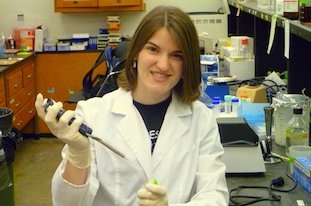Several groups studying Parkinson’s have had a hunch – a gut feeling, even – that intestinal inflammation is involved in driving the disease. Now Emory researchers led by Malu Tansey, PhD have some evidence from patient samples to back it up, published in the journal Movement Disorders.

IMP graduate student Madelyn Houser
German pathologist Heiko Braak has been honored by the Michael J. Fox Foundation for Parkinson’s Research for his theory, originally published in 2003, proposing that disease pathology – marked by aggregation of the toxic protein alpha-synuclein — may begin in the gastrointestinal tract and migrate from there to the central nervous system. This proposal was both provocative and influential in the Parkinson’s disease (PD) field. And Tansey herself has long been interested in the role of microglia, the immune cells resident in the brain, in PD.
The first author of the new paper, Immunology and Molecular Pathogenesis graduate student Madelyn Houser, notes that digestive problems such as constipation are frequently reported in PD patients. But what is the cause and what is effect? As neurologist Stewart Factor observed for a Emory Medicine article on PD’s non-motor symptoms: “A patient might tell me he’s had recurring constipation for 10 years, but he wouldn’t say anything to a neurologist about it until he starts having other symptoms.”
Other papers have identified changes in intestinal microbiota and increased intestinal permeability in PD. But there wasn’t much information on intestinal inflammation – only a small pilot study looking at colonic biopsies.
“We posit that intestinal inflammation in PD is a mechanism that could drive neuropathology and ultimately neurodegeneration in the central nervous system,” Houser writes. “Constipation, dysbiosis, intestinal permeability, and increased levels of alpha-synuclein would all be consistent with inflammatory conditions.”
To test the idea, she and Tansey worked with clinicians, such as Factor and others from New York and Seattle, and Haydeh Payami’s lab at University of Alabama, Birmingham. They examined stool samples from 156 Parkinson’s patients and 110 controls, including spouses, which helped the researchers iron out environmental influences.
In stool from PD patients, they found elevated levels of three inflammatory molecules: vascular endothelial growth factor receptor 1, interleukin-1α, and CXCL8. Two of those (interleukin-1α and CXCL8) remained statistically significant even after accounting for potential confounding factors, and two others high in PD (interleukin-1β and C-reactive protein) were revealed only after these other factors were accounted for.
Looking at stool samples could be advantageous if GI inflammation were to be monitored regularly in PD or used to aid in identification of individuals at risk for the development of the disease, Houser says.
The researchers also saw some distinctive effects of smoking and from taking probiotics. The next question is whether intestinal inflammation is a contributing factor to or a consequence of, neuropathology and neurodegeneration.
“Looking at patients over time indicates that intestinal inflammation does not develop in late stages of PD or emerge as a result of advanced age, lending support to the idea that gastrointestinal inflammation is present from the early stages of the disease and could even contribute to its progression,” Houser says. “If chronic GI inflammation does promote CNS neuropathology, as we predict, that means that treatments targeting intestinal immune activity have the potential to slow the progression of PD.”
Blog post by Tansey and Houser from 2017
Related UAB link focusing on microbiome

